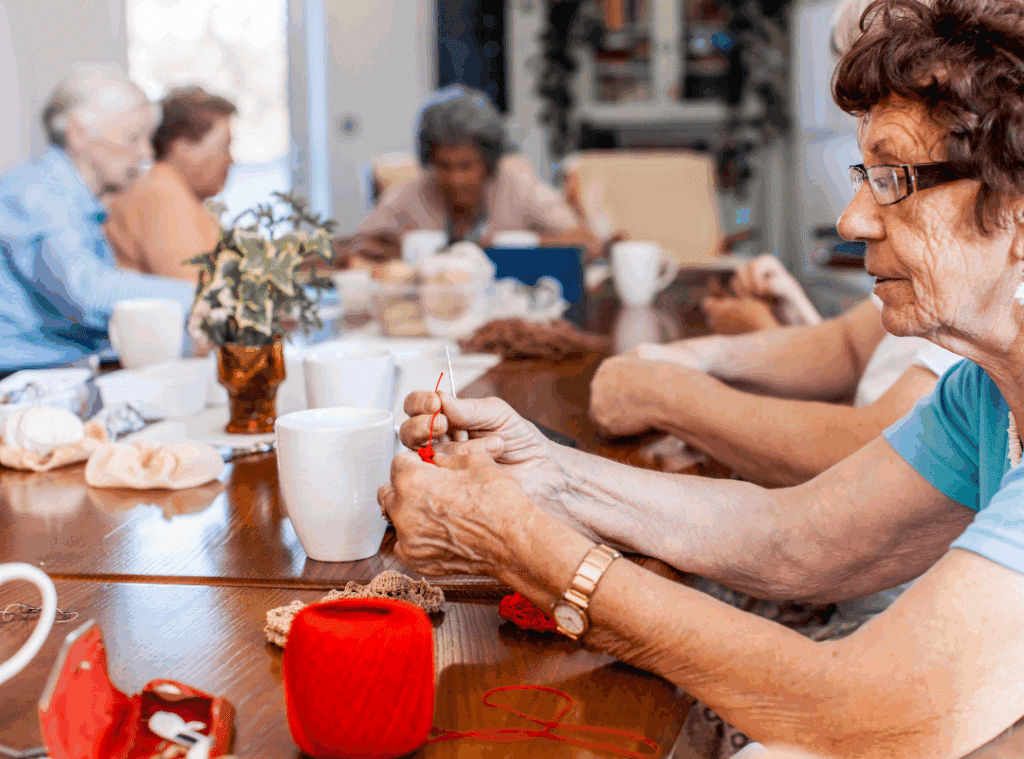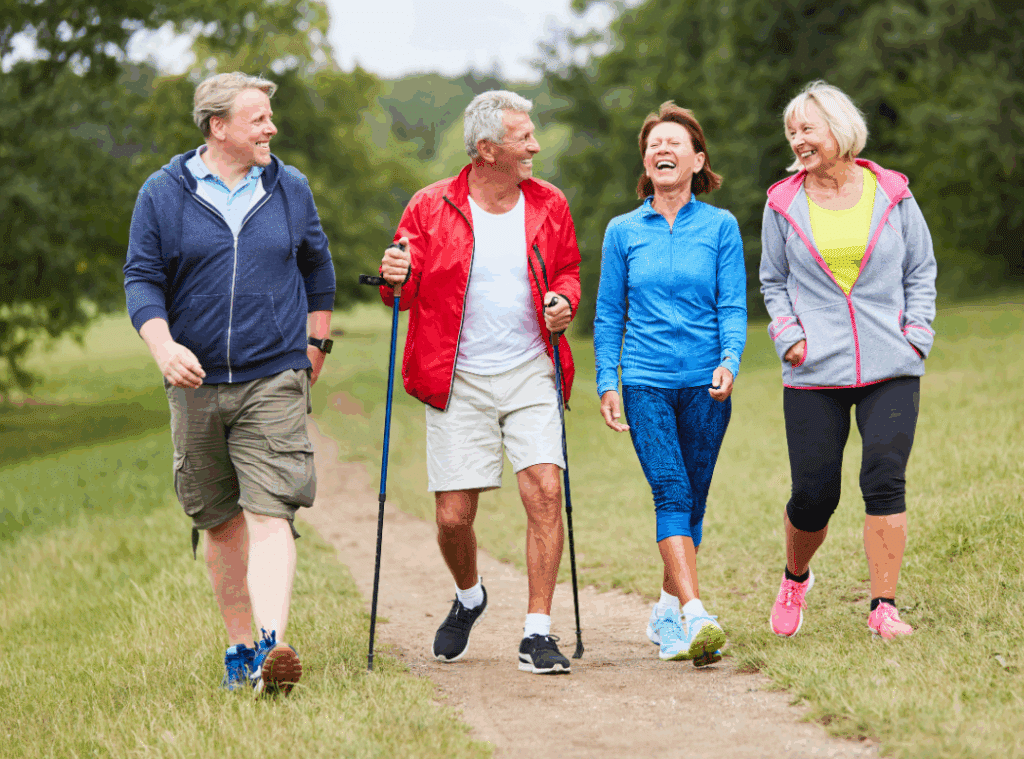A healthy lifestyle for seniors involves more than just good nutrition or regular doctor visits—it’s about creating daily habits that support long-term wellness. As we age, our bodies and minds change, and adapting to these changes is crucial for maintaining independence and a high quality of life. This includes choosing nourishing meals, staying active, promoting emotional well-being, and cultivating a supportive community.
At Westmont Living, we believe that vibrant aging starts with intentional living. From balanced diets to joyful hobbies and meaningful connections, every decision can lead to improved well-being. In this guide, we’ll explore practical ways seniors can build and sustain a healthy lifestyle, with tips on nutrition, mental and physical activity, and how to stay engaged in a fulfilling life.
Learn more at Westmont Living.
Healthy Lifestyle Choices for Seniors
To live well in your golden years, start with choices that promote long-term health. Adopting a healthy lifestyle for seniors begins with a balanced diet. Focus on well-balanced meals that include fruits, vegetables, whole grains, and lean proteins. Healthy snacks for senior citizens, such as Greek yogurt, apple slices with almond butter, or hard-boiled eggs, provide energy between meals and support overall wellness.
Seniors should also stay hydrated and get at least seven hours of sleep each night. Sleep helps repair tissues and supports brain function. If you’re wondering how much Ensure per day for elderly individuals is appropriate, the general guideline is one to two servings daily—always consult your healthcare provider for personalized recommendations.
Meal planning can help maintain consistency. Try a 7-day meal plan for the elderly that includes breakfast options like oatmeal with fruit, simple lunches such as tuna salad wraps, and nourishing dinners like baked salmon with steamed vegetables. Having structured meals reduces the risk of skipping meals and ensures you’re getting essential nutrients. For more ideas, check out this nutrition resource from the National Institute on Aging.
Participation in local nutrition programs can also improve access to healthy food and education on dietary needs.
Importance of Physical and Mental Activity
Regular physical activity and mental stimulation are essential components of a healthy lifestyle for seniors. Physical activity boosts cardiovascular health, muscle strength, and balance. Incorporating old people’s snacks that are rich in protein—like cheese cubes or mixed nuts—before or after exercise can help replenish energy.
Engaging in 30 minutes of activity most days of the week is ideal. Brisk walking, light stretching, and even seated exercises are excellent options. To add variety, consider these senior exercise programs that energize both the body and spirit.
Benefits of Regular Exercise
Consistent exercise improves mood, reduces the risk of chronic illnesses, and supports mobility. For seniors, balance-focused exercises are essential for preventing falls. Incorporating dynamic balance exercises can dramatically enhance confidence when walking or transitioning between positions. Even low-impact workouts, such as tai chi or water aerobics, can make a significant difference in day-to-day function.
Engaging Cognitive Activities
Just as you work your body, your brain also benefits from regular use. Activities such as crossword puzzles, board games, or journaling improve memory and mental agility. Creative expression, like painting or storytelling, promotes emotional balance. Westmont Living encourages participation in cognitive games to maintain sharpness and reduce the risk of cognitive decline.
Maintaining a Positive Outlook and Emotional Health
Emotional well-being plays a significant role in overall health. Seniors who maintain a hopeful attitude often cope better with the challenges of aging. Practicing mindfulness, spending time with loved ones, and pursuing hobbies can help maintain a healthy lifestyle for seniors.
Cultivating Gratitude Practices
Keeping a gratitude journal or simply reflecting on what brings you joy can shift your focus to the positive. Even small habits—like starting your day with an uplifting quote—can cultivate contentment. Helping others, whether through volunteer work or daily kindness, reinforces a sense of purpose.
Importance of Social Connections
Being around people who care about you supports mental resilience. Social isolation can lead to depression and anxiety, so prioritizing relationships is vital. Consider joining a book club, attending community events, or reconnecting with old friends. Social engagement fosters emotional resilience and helps combat loneliness. Overcoming depression and anxiety begins with connection.

Engaging in Joyful Activities
Hobbies like gardening, music, or group exercise can lift your spirits. Hosting weekly game nights or joining a walking group can keep you connected and active. Don’t underestimate the impact of daily joy on long-term well-being—it’s as important as diet or exercise.
Regular Health Check-ups and Awareness of Dementia
Preventive care ensures early detection of potential health issues, including dementia. Seniors should schedule annual physicals, vision and hearing screenings, and cognitive assessments. Be mindful of symptoms like forgetfulness or confusion, which could be early signs of dementia.
Creating a relationship with your doctor where you feel comfortable discussing changes in memory or mood is essential. Proactive monitoring leads to quicker interventions and a better quality of life.
Promoting Healthy Ageing Through Engagement
Active aging isn’t just about mobility—it includes learning, growing, and contributing to your community. Staying mentally and socially engaged supports long-term cognitive and emotional health.
Here are a few ideas to promote engagement:
- Attend senior workshops or cultural events.
- Volunteer at a local food bank or library.
- Share meals with neighbors using your 7-day meal plan for the elderly as a guide.
- Host a group to exchange ideas for healthy snacks for senior citizens.
- Start a book club focused on wellness topics.
Every effort you make to connect and contribute keeps you energized and purposeful.
Resources for Supporting Senior Health and Wellness
Many local organizations and online platforms offer support tailored for seniors. From apps that track hydration to websites that share old people’s snacks and wellness tips, these tools make healthy living easier. Visit the CDC’s Healthy Aging page for tools and guidelines on senior well-being.
You can also explore community senior centers that offer classes, health screenings, and meal delivery services. If you’re wondering how much Ensure per day for elderly individuals, these centers often have nutritionists who can guide your intake based on your personal needs.
A New Chapter: Living Well with Purpose
Your golden years can shine brightly when you live with intention. At Westmont Living, we support you every step of the way—through nourishing meals, social opportunities, and fitness programs tailored to your needs. Embracing a healthy lifestyle for seniors doesn’t require perfection—it simply starts with making one positive choice at a time.
Whether it’s trying new healthy snacks for senior citizens, exploring a 7-day meal plan for the elderly, or even asking how much Ensure per day for the elderly is recommended, each decision moves you closer to a vibrant life. So don’t hesitate—take that step today. Discover your joy, build your wellness routine, and thrive with confidence.
Contact us at 858-456-1233 or visit our website to learn how Westmont Living can support your journey to lasting health and happiness.
How Do The Costs Of Moving Into A Quality Senior Care Community Compare With The Costs Of Staying At Home?Compare The Costs of Senior Living vs Staying at Home
Frequently Asked Questions
What should seniors do to stay healthy?
Seniors should prioritize regular physical activity, a balanced diet, routine check-ups, and maintaining social engagement. Daily walking, light strength exercises, and hydration can go a long way. It’s also important to manage stress and get enough sleep. Staying up to date with medical screenings and vaccines supports long-term wellness.
What is a healthy old age lifestyle?
A healthy lifestyle in old age includes eating nutritious foods, staying physically active, and maintaining strong social connections. Seniors should also avoid smoking and limit alcohol intake. Incorporating hobbies, mental stimulation, and regular medical care helps maintain independence. A positive mindset and daily routine can also enhance emotional well-being.
What is the most important health habit for older adults?
The most essential habit is staying physically active, as it impacts nearly every aspect of health. Regular movement supports heart health, mobility, and mental clarity. It also helps prevent chronic conditions like diabetes and osteoporosis. Even simple activities, such as walking or stretching, can make a significant difference.
What is the best quality of life for seniors?
The best quality of life means living with purpose, independence, and good health. Seniors thrive when they have access to supportive relationships, enjoyable activities, and a safe living environment. Managing health needs and staying socially and mentally active play a key role. Feeling valued and staying connected to others greatly enhances daily satisfaction.








